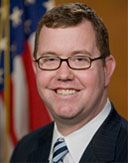Five nominees are cleared, others are snagged
 Although a few openly gay nominees are still snagged, a Republican-led logjam against Obama nominees was briefly cracked this month, enabling the U.S. Senate to confirm 75 candidates for various executive branch offices, including four openly gay ambassadors and the highest openly gay official at the Department of Justice.
Although a few openly gay nominees are still snagged, a Republican-led logjam against Obama nominees was briefly cracked this month, enabling the U.S. Senate to confirm 75 candidates for various executive branch offices, including four openly gay ambassadors and the highest openly gay official at the Department of Justice.
Most of the confirmations, including the five openly gay appointees, were approved collectively by a single voice vote (known as unanimous consent).
The openly gay nominees confirmed August 1 included Stuart Delery as assistant attorney general for the DOJ Civil Division and ambassadorial appointees James Costos to Spain, John Berry to Australia, Rufus Gifford to Denmark, and Daniel Baer to the Organization for Security and Cooperation in Europe. Berry will be sworn in Friday, August 9.
Although Senator Charles Grassley (R-Iowa) submitted several gay-related questions to Delery in writing, there was no other apparent scrutiny given to the gay nominees suggesting they might be opposed for some reason related to their sexual orientation.
But the nominees notably did not include President Obama’s nomination of Chicago gay businessman James “Wally” Brewster to serve as ambassador to the Dominican Republic. Though the Texas native was nominated the same day as Berry, there may be a snag with the choice of an openly gay person to serve in the Dominican Republic, an island nation that is about 69 percent Catholic and 11 percent evangelical.
According to Dairio Librio, a local paper, at least one Christian church organized a protest, asking people to show their dissatisfaction with Brewster’s nomination by wearing black one day last month. Pastor Sauford Medrano said he wasn’t opposed to gay people but considers homosexuality a sin. When the day of protest came, Dairio Librio asked several people why they were wearing black, but each one interviewed indicated it was just “by chance.”
CNSNews.com, a conservative news organization, quoted the auxiliary Catholic bishop of Santo Domingo, Pablo Cedano, as saying that, if Brewster arrives in the DR as ambassador, “he is going to suffer and will have to leave.” Several U.S. news websites have quoted the country’s Catholic cardinal, Nicholas Rodriguez, as referring to Brewster publicly with the Spanish equivalent of “faggot.”
But those remarks came weeks before the recent high-profile statement by Pope Francis, concerning gay priests: “If someone is gay and he searches for the Lord and has good will, who am I to judge?”
Like many ambassadorial nominees, Brewster was a big donor to President Obama’s re-election effort. More than many others, he has held high-profile positions in LGBT entities, including serving as a national co-chair for LGBT people on the Democratic National Committee, a national co-chair of the LGBT Obama for America re-election campaign, and serving on the national board of the Human Rights Campaign.
It is not clear whether there is any opposition to Brewster’s nomination in the Senate. There apparently was none for this month’s openly gay candidates, and last month, only 17 senators (all Republicans) voted against the re-nomination of the openly gay president of the Export-Import Bank, Fred Hochberg.
So far, President Obama has appointed openly LGBT people to 277 positions in his administration.
Several important ones are still pending, including Elaine Kaplan, to serve on the U.S. Court of Federal Claims. Kaplan, whose nomination was advanced out of the Senate Judiciary Committee June 6, was initially appointed to serve as General Counsel for the Office of Personnel Management. She has served as acting director of OPM since Berry’s resignation in April. Kaplan’s questionnaire responses to the Senate indicated she has served on the HRC board, was a member of the National Gay and Lesbian Task Force and of Parents and Friends of Lesbians and Gays, and Gay and Lesbian Parents International. She also made presentations to two White House LGBT events for youth and families and to numerous other LGBT-related events in and outside the federal government.
Six current and former federal employees signed a letter to the Senate Judiciary Committee in April, expressing “reservations” about Kaplan’s nomination. The employees had each sought protection through Kaplan’s previous position as U.S. Special Counsel for their whistle-blowing activities. They say her actions as Special Counsel weakened the federal Whistleblower Protection Act.
Kaplan’s nomination could come up on the Senate floor anytime after Congress reconvenes September 9, following its month-long summer recess.


Leave a Reply